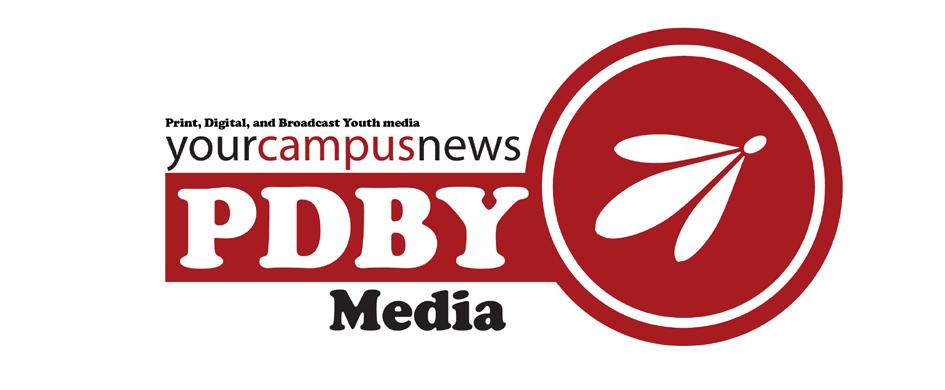






Copy:
Nondumiso Mntambo
Lee Tankle
Lwando Mfundisi
Karla van Dyk
Kamogelo Thando Mabe
Luka Joubert
Busisiwe Yaka
Lizé Behrens
Luke Best
Nicholas Da Costa
Nolwazi Sangweni
Jade Fabri
Zanrie Linstrom
Layout:
Khumbulani Chaima
Annelize Breed
Sagarika Dash
Owam Ngwneya
Joshua Hunter
Nthabiseng
Izabel Stickells
Thimna Quinta
Multimedia:
Cletus Mulaudi
Tshepang Rihlampfu
Sharon Dumba
Jaime Lamb
Sanele Zulu
Mokgome Sechaba Ntshehi
Cleo Qin
Salani Masevhe
Richard Junior Nathan
Katharine O’Ehley
Nothando Mhaule
Web:
Onele Gabadu
Keegan Bosman
Carl Unathi Ndlovu
Social Media:
Tsholofelo Mogotsi
Sibusiso Mabotja
Smele Mzobe
Manaletsana Percy Mogwane
PDBYMedia, formerly Perdeby, is the official independent student newspaper of the University of Pretoria. We are committed to providing fresh and entertaining news content for UP students, by UP students, about UP issues.
Editorial
Editor-in-chief carel.willemse@up.ac.za
Carel Willemse @Ed_in_Chief
Editor editor@pdby.co.za

Leah Rees @pdbymedia
Digital Manager digitalmanager@pdby.co.za
Leah Rees @pdbymedia
News news@pdby.co.za
Amukelani Makamu @khelanimeigh.rsa
Deputy News news@pdby co.za
Mothusi Mokalane @mr_mokalane
Features features@pdby.co.za
Kirsten Minnaar @kirsten_minnaar
Entertainment entertainment@pdby.co.za
Ashleigh Pascoe @ashleigh.pascoee
PDBY appreciates that freedom of speech is an inalienable right enshrined in the Constitution of the Republic South Africa. We encourage our readers to engage in discussion and debate on issues that affect them through letters to the Editor, comments on our website, tweets, or posts on Facebook. We ask our readers to keep the following in mind:
1. PDBY will not edit letters, comments, tweets, or Facebook posts in any way.
2. PDBY will label letters, comments, tweets, or Facebook posts as opinion. These do not represent the views of PDBY in any way.
3. The PDBY editorial must approve letters, comments, tweets, or Facebook posts before they are published.

4. PDBY will not publish letters, comments, tweets, or Facebook posts that are defamatory, or libelous, or that contain offensive content.
Sport sport@pdby.co.za
Katherine Weber @isleepalldayandallnight
Copy copy@pdby.co.za
Ntokozo Xulu @ntokozo__xulu
Visuals visuals@pdby.co.za
Masehle Mailula @masehle_mailula
Multimedia multimedia@pdby.co.za
Masehle Mailula @masehle_mailula
Layout layout@pdby.co.za
Kelly Anne Kong Kam Wa @kelly.anne15
Web webeditor@pdby.co.za

Social Media socialmedia@pdby.co.za Marketing marketing@pdby.co.za
5. PDBY reserves the right to practice discretion when publishing letters, comments, tweets, or Facebook posts.
6. PDBY reserves the right to publish any content we receive unless the sender specifically requests otherwise.
7. PDBY reserves the right to retract a letter, comment, tweet, or Facebook post after it has been published.
8. PDBY will not accept responsibility for any consequences the author of a letter, comments, tweets, or Facebook posts may experience as a result of the letter being published.
9. PDBY will only publish letters between 150 and 200 words.
10. PDBY will not publish letters unless the writer confirms their full name, student number and contact number. PDBY will not publish this information, we need it for our records.
Banathi Nkehli
On 23 September, PDBY received an advisory opinion from the Constitutional Tribunal concerning the alleged unlawful acquisition of students’ personal information by the Democratic Alliance Student Organisation (DASO) during the most recent UP SRC election cycle. The advisory opinion presided over by judges: Daniella de Figueiredo and Zakariya Adam, concluded, “there had been a prima facie violation of student privacy rights by DASO in the manner in which they have attained this information.” However, the court simultaneously concluded that DASO had: “Seemingly acted within the bounds of the law in sending out the message as empowered by section 31 of POPIA.” However, the most important takeaway from the advisory opinion may very well be the fact that DASO UP may have relied on the efforts of the national Democratic Alliance (DA) to pull off the most interesting information heist in UP memory.
The judgement
The court arrived at two seemingly
contradictory conclusions. DASO has violated student privacy rights in the manner in which they collected that information, however, they simultaneously acted within the bounds of the law when processing that information. On consultation with the panel, their reasoning is premised on the information, or rather the lack of information, DASO could provide as to the nature of its database where the information was derived as Judge Adams explains, “We can’t say where the data came from exactly. As [DASO] refused to explain where they got the information but rather insisted that it was acquired lawfully without explaining that lawfulness.” Therefore, when the court made its inference that the information was acquired unlawfully but simultaneously processed lawfully, this is premised on Schrodinger’s lawful database, which may or may not be. In addition, the court confirmed that the SMSes were not sent out by DASO UP members and instead by former UP SRC president, Kwena Moloto with the knowledge of DASO’s presidential candidate at the time, Liam Jacobs.
The bigger picture
In PDBY’s consultation with the panel,
the panel could not stress any further that this is a bigger matter than we realise and that their capabilities were limited in answering the legal questions presented. As Judge de Figueredo explains, “DASO is a smaller part of the DA and the tribunal has, limited resources and no real authority outside of UP, to make any meaningful decision on the matter and this is something that the Information Regulator would have to take on directly.” These limitations were exacerbated when a member of the National Assembly and legal representative for DASO, Werner Horn, was invited to a consultation with the panel on 1 September. Horn criticised the tribunal and the manner of the proceedings and refused to directly answer any questions relating to the nature that information was collected for the database in question, yet maintained that the information
was lawfully acquired. Horn would go on to make some interesting averments going forward as judge Adams explained, “According to Horn, the SMS was not limited to just UP students and that anyone on their national database could have very well received the SMS that wasn’t solely aimed at UP students.” However, this averment must be approached with great circumspection as the recipients that PDBY and the Tribunal had interviewed offer a different outlook in this regard. The aforementioned group is neither registered on the voters’ roll nor any DAaffiliated resources, and Horn’s averments do not sustain any credibility in light of this. PDBY made several attempts to reach out to Liam Jacobs and Shaina Moses to no avail, with Jacobs expressing his disinterest in responding to these allegations directly.
Leah Rees
On 14 September, UP and its stakeholders discussed a range of issues in front of the National Assembly’s Portfolio Committee for Higher Education, Science, and Innovation. UP management discussed and answered questions regarding the registration fee increase protests spearheaded by members of the SRC in August, transformation, and sexual harassment amongst many other burning issues.
Sexual harassment
Severe allegations against UP involving sexual harassment and labour violations were lodged by the labour movement at UP (which includes APSA, NEHAWU, UPWO, and Solidarity which collectively represent approximately 30% of UP’s total workforce).
According to the Committee’s summary of the meeting: “sexual harassment allegations were emphatically and repeatedly raised by members as a significant matter of concern”. The Union highlighted a specific alleged incident where a female staff member was sexually harassed and then subsequently offered a director position. This allegation of sexual harassment was made against Vice-chancellor Prof. Tawana Kupe.
Concerning the allegations lodged against Prof. Kupe he said “I cannot comment on that, I’ll leave it to the investigation. I fear absolutely no investigation. I put this on the record because as one member here said an allegation thrown out to you used willy-nilly without a basis in facts or an independent investigation are harmful. In fact for me today it might be that I actually should not continue in my position, how do you hold your authority in this context.”
The Union also expressed concern that cases are not dealt with the dignity they deserve and that there is a difference in the way the UP handles allegations of sexual harassment - which ultimately depend on the race of the accused.
Following these allegations, the Committee not only requested a report from the UP council regarding all cases of sexual harassment that allegedly have occurred at UP and were brought to their attention.
However, before the submittal of this report UP was also requested to hold a stakeholder’s meeting within two weeks following the presentation, which would have fallen around the
time of 28 September.
However, it was reported that this meeting did not happen and that subsequently the report will also be delayed. According to the Director of the Department of Institutional Advancement, Rikus Delport, “the university is looking into a date that will suit all parties for both the stakeholder engagement and report back to Parliament” as “UP was unable to confirm a date with all parties”. Delport stated that UP will revert to the Committee by 28 October.
Protesting: a last resort
Prof. Kupe reported on the August protests saying that students were misinformed as UP has no ‘registration fee’ but rather an initial payment to be made at the beginning of the year. Prof. Kupe explained in his presentation that the initial fee which increased is still lower than three other institutions, and does not affect the overall tuition fee.
Prof. Kupe described the protest as an “attempt to mobilise” which he stated was allowed as it is part of South Africa’s Constitution. However, what Prof. Kupe described as “being not okay” is when students resort to the disruption of classes or the blocking of buses or campuses. Prof. Kupe also explained that the suspension of students was a method “to persuade them” to halt this action which led to the matter being resolved.
However, what was interesting is that the 2022 SRC President, Thuto Mashile, and SRC Secretary General, Tarik Lalla as well as the Union, expressed that they resorted to mass action this year, as a last resort to persuade UP to listen. The Union expressed a level of understanding with the SRC as they agreed that things take too long at UP so they resorted to strikes as a tool to get the vice-chancellor’s attention regarding salary concerns.
Several Committee members also seemed to understand the position of the SRC regarding their decision to protest in August, especially if the university makes themselves, in the words of Committee member Duduzile Patricia Sibiya “untouchable”. Sibiya also wondered if the protest was caused by students if management seemed difficult to engage with.
The SRC responded to the protest discussion by emphasising that although students did disrupt lectures, all engagements were nonviolent with the intention of forcing a meeting
According to Lalla this meeting has still not occurred.
However, Lalla alleged that there was the victimisation of student leaders by UP as a narrative was painted that the students involved were hijackers or intimidating students, which is incorrect and harmful.
A shift to English, Sepedi, and Afrikaans
Mashile and Lalla also showed support for a shift to multilingualism, especially as this would create a more representative academic space. This shift would involve UP moving from one main academic language, English, to three; English, Afrikaans, and Sepedi.
However, they expressed concern that a push towards multilingualism will return UP’s main languages of academic engagement back to English and Afrikaans. Lalla expressed that although Sepedi is the third proposed language, it is currently not at the same level as the other two languages and therefore concerns exist that it might become an afterthought.

Other issues
Mashile and Lalla brought up a multitude of other concerns. These include the placement in TuksRes lacking transparency, issues faced by students in private accredited accommodations, residence culture being unconducive to students of colour, and that students feel uncomfortable raising their concerns, especially in residences,

safety and said that even on campus “students do not feel safe” and that this feeling exists in student spaces on and off campus. Lalla also expressed concerns regarding the Green Route, saying that security guards might not feel safe if they accompany students to and from their accommodations if they are alone.
Lalla also said that the SRC is concerned over the cost of food on campuses as although food prices have increased, and there is a justification for this increase, there is an inconsistency in prices of food across campuses. Lalla also brought up the lengthy periods and procedure in place before being able to see a psychologist with the UP Counselling Unit.
The Committee also had an opportunity to ask questions following the presentations. However, Prof. Kupe explained during his response to the Committee’s questions that said there should have been better coordination as to what was required of UP and a better administrative process on behalf of the Committee. Prof. Kupe said that of all the questions asked, UP had answers to 75% of them at the time of the presentation, as they had 70 slides. However, they did not have sufficient time to delve into their entire presentation in only an hour.
However, presentations aside, one must wonder how UP will handle the investigations into these allegations and whether they will be swept under the rug or met with an appropriate amount of transparency - but time will tell.
In March, the residents of Studios@ Burnett issued a memorandum with a list of grievances to the Feenstra Group (the company that owns Studios@Burnett) in hopes that their grievances would be addressed and resolved. Months later, it seems as if the memorandum that was issued did not have any impact as residents are still facing the same issues.

The students grievances include issues such as Wi-Fi, fumigation, the sexual harassment policy and electricity, just to name a few. When asked if anything has been done by management to address these issues, a resident who wishes to remain anonymous said “only the sexual harassment policy was amended, but with regard to other issues nothing has really changed since then. We are still faced with the same issues if not more.”
The updates and amendments to the sexual harassment policy are yet to be finalised by residents and experts from the University of Pretoria - but according to residents issues surrounding electricity have not beeen addressed yet. According to the residents, they are being overcharged for electricity. “We spend so much on electricity because of this problem,” said a resident.
Furthermore, the residents have also taken
issue with the Wi-Fi because of how slow and unstable it is. When asked about how residents feel about this and how it is affecting them, the resdient said, “the Wi-Fi is just frustrating because it is so slow and, as students, we need reliable and fast Wi-Fi to do our academic work”. This is affecting the residents in multiple ways – financially (as many residents have opted to get their own portable routers) and academically. The residents have, upon numerous accounts, reported this and nothing has been done to date. Another issue taken up by the residents is the cockroach problem in the residence. “There’s always some fumigation happening but the roaches never really die or go away,” said a resident.
According to the residents, the building and its furniture have also not been maintained.
“There is a mirror in my room that has since been broken. I reported it and it has not been fixed,” said the resident. The residents are aware of the proper channels that should be followed to report any issue - yet these issues have, nevertheless, remained unresolved with minimal recourse. The rental fee is set to increase in 2023 and the residents are discontent as they feel that this is adding onto an already long list of grievances.
When contacted for comment, the management of Studios@Burnett said, “there are systems in place for residents to lodge their
On 25 September, an unidentified male died and was subsequently found in Tuks Ekhaya residence.

According to UP he was not a UP student but “entered the residence with a group of students who returned from a night out”. Following this he entered an unlocked and unoccupied room, where he was subsequently found by a Tuks Ekhaya EC member. Brooklyn SAPS has confirmed
that the cause of death is unknown as they are currently investigating.
Rikus Delport, the Director for the Department of Institutional Advanced, said that “the matter is being investigated […] and that all queries should be referred to the police”. He further said that “people should handle the incident with sensitivity out of respect for the deceased’s family and friends.
The EFFSC recently issued a statement calling upon the dean of the Economic Management Science faculty and the Department of Auditing to formally initiate the process of awarding the late Thapelo Menwe his honours degree posthumously.
According to the EFFSC Menwe had already done most of his course work and him being awarded this honours degree posthumously would in some way celebrate his life and acknowledge his academic commitment prior to his death. The EFFSC also believes that Menwe being awarded the degree posthumously will show a compassionate interaction between the university and the family and will bring closure to a tragic situation for both family and friends of Menwe and the university at large.
The EFFSC’s request was however
rejected by the office of the dean on the basis that according to the General Academic Regulations, rule A24, qualifications may be awarded posthumously, on recommendation by a dean (with the exception of an honorary degree), if the student complied with all the requirements of the qualification concerned before passing away. The late Thapelo Menwe however had only passed 10 credits of the 120 credit qualification, hence the office of the dean could not award the degree posthumously.
In the statement issued the EFFSC also said that it will commence with the process of approaching the City of Tshwane to rename Grosvenor Street to Thapelo Menwe street. The outcome of these proceedings remains unknown as the EFFSC has not given their side of the story with regard to this matter.
complaints and as the management, we try our utmost best to try and solve different problems that residents might have. Residents can log in on their portals at any time and report a problem. Even then if it is not solved, they can

Advertisement:
UP 2022 Graduate Destination Survey: Key Findings
escalate the problem to the property manager directly. However, it is difficult to comment on these unresolved issues as they are not specific, and there are systems in place to solve any problems that might be there.”
The Department of Institutional Planning, Monitoring, and Evaluation (DIP), houses the Market Research function at UP which provides up-to-date market management information. A key method for monitoring is market surveys. The Graduate Destination Survey (GDS), conducted by DIP, is a means of assessing shortterm outcomes of UP graduates. These findings inform and guide growth and enhancement across UP’s academic offerings. Key findings of the GDS are presented to establish the employment status and study pursuits of all UP graduates across faculties and the Gordan Institute of Business Science (GIBS), subsequent to the Autumn (April – May) graduation ceremonies in 2022.
The University of Pretoria is one of the largest universities in South Africa and it has a student body consisting mostly of undergraduate students. With this in mind, one may wonder whether the university can accommodate all these students and their cars.
To start with, undergraduate students are not permitted to park on Hatfield’s main campus before 16:30, and although there are four allocated parking lots around the campus, the demand for parking continues to rise while the space remains limited. This has resulted in countless students parking in the surrounding areas outside the university. Along with the rush to find parking space, other issues have developed, like students receiving parking tickets and more commonly, the problem with car guards.
According to various students, who wish to remain anonymous, a few car guards surrounding UP have been intimidating students and demanding exorbitant fares. It has been reported that car guards have been preventing students from leaving a parking space without payment by blocking the vehicle. In addition to this, students who park alongside Lynnwood Road are frequently issued parking tickets from the Metro Police for “parking on a paved portion of a sidewalk”. A car guard explained that students should parallel park to avoid partially parking on the sidewalk. However, some car guards do not allow students to parallel park without them paying an initial fee and prefer for students to
park perpendicularly as it optimises spaceallowing for more cars to park.
A general survey revealed that the car guards around the university are mostly selfemployed.They depend entirely on the tips that they receive from students to make a living and a large portion of their acquired money goes toward their transport fees. However, it


On 1 September, the Law House 2021/2022 executive committee, along with PDBY , were sent an email from the outgoing vice chairperson of Law House, Ulrich Steynberg titled, ‘Breaking my silence.’ In this email, Steynberg details a series of events that led to a perceived irregularity on the chairperson ballot. This caught the attention of various stakeholders bringing into question the legitimacy of the established election procedures and its consequential results.
Prior to Steynberg’s email, the Economic Freedom Fighter Student Command (EFFSC), sent out an email in which they allege that there have been a series of improper election practices during the most recent election cycle. Among these election irregularities, the EFF alleges that the incoming chairperson of Law House, Jeandre Otto, “did not submit a nomination form to run for chairperson but has [since] been added on the ballot [...] for the Chairperson position after interaction with Sipho Carneson.”
However, the story is not as simple as an irregularity on a ballot, but an election strategy that took a serious detour from its intended course. Steynberg’s email elaborates on these details by suggesting that Otto’s plan to get to the seat of Law House chairperson, was predicated on a series of obstacles that began with the nomination of Jozias MahubeReinecke, who Otto perceived as the only real challenge to his run for Law House chairperson. Due to this, Otto requested that Steynberg contest against Mahube-Reinecke for the seat of chairperson with the express purpose of Steynberg subsequently being
able to select Otto as vice chairperson, upon his assumed victory.
However, the plan as envisioned by Otto could no longer go as planned, as Steynberg explained, “personal reasons [...] led me to decide that I had to drop out of the election as I could not stand another minute with the DSA. [After this], Otto went on a spree telling people how I intentionally sabotaged him and ‘f*cked up his dreams’”.
Thus, Otto’s plan was compromised and Mahube-Reinecke was still a thorn in his run for chairperson. However, in a strange turn of events, due to some political and procedural serendipity, Mahube-Reinecke was removed from the chairperson ballot. This was a result of his suspension after events at the second quarter 2022 Student Forum - the consequences of which allowed Otto to run for Law House chairperson.
The answer to this question is no. According to Sipho Carneson, the project coordinator for Faculty Houses, said “Otto’s election waiver stated that he wanted to run for both ballots, both chairperson and executive committee. However, the election ballot that we received that only had [Otto] appear on the EC ballot. When we crossreferenced the application form that was submitted on [Otto]’s behalf by Steynberg, Steynberg erroneously entered in [Otto]’s details as only wanting to run for the EC ballot.”
Steynberg confirms that it was indeed him who had submitted the election application on Otto’s behalf and agrees with Carneson’s explanations to an extent. Steynberg explains, “I did submit his form on the basis of the general agreement that we had”.
The reason Otto was able to appear on the ballot in spite of the due date for nominations
is an unfortunate reality that many students cannot afford to tip car guards in generous amounts or even daily.
Car guards are a form of unarmed security officers. The Private Security Act of 2001 clearly states that “Any person who renders the security service of protecting property or a person for a reward must be registered with
the PSIRA”. The Private Security Industry Regulatory Authority (PSIRA) further stipulates that anyone who is not registered with the PSIRA is conducting a criminal offence and could be penalised or arrested. Therefore, no student or person is obliged to pay them. In fact, “begging” is against the rules and regulations of being a car guard or security officer in South Africa.
In 2016, UP’s former Vice-Chancellor, Prof. Cheryl de la Rey, assembled a group of self-employed car guards and offered them assistance and a stable salary. This group, who had been working at UP since 2000, said that this relief was short-lived. After three months the “assistance plan” completely collapsed and the car guards said that they never heard from the university again. The Manager of Compliance, Chris Colyn, from the Department of Security Services did not comment, claiming that he is not allowed to disclose any information. After being referred to the Director of Institutional Advancement, Rikus Delport, Delport declined to comment or confirm the car guards’ “assistance plan”. Due to the lack of communication from UP, it is unclear whether there is a solution to these recurring problems. Students who have lodged complaints informed the Student Centre on Hatfield’s main campus, but they have been redirected to the Department of Security Services. Furthermore, Delport declined to answer questions regarding student safety, and whether there is another forum where students could report this issue, provided that it may not be the university’s responsibility.

having passed, is because of how the student life policy mandates elections. Carneson explains, “the Director of Student Affairs has the ability to dictate and delegate election processes and procedures in a given year and this is in the Organised Student Life Policy.” Meaning, the DSA can be flexible with the procedures within the Organised Student Life Policy, as Carneson elaborates, “as you can imagine, if a policy said something along the lines of, ‘Hey we need to vote by ballots in boxes and then COVID-19 happens, we do have the power to manoeuvre around something like that,’ and that’s what happened in this instance with Otto.”
Therefore, according to Carneson there was no unlawful or procedural irregularity as the EFFSC and Steynberg aver, merely a series of procedural happy accidents.
Controversies such as the one discussed above, come with the obvious price of losing faith in systems constructed with the
intention of putting the fates of students in the hands of students. Carneson responding saying that mistrust within the electoral system is with the intention of establishing their voter base.
Carneson continued saying, “if the voter base is kept small, then you create a voter base that you can segment, target and identify and attribute your messaging focused on that cohort.” Carneson’s analysis may be true to EFFSC, but that may not be the case for Steynberg.
Steynberg has no intentions of eroding trust in the system, for Steynberg this was about his reputation and integrity as Steynberg explains, “I really hope that this does clear the air somewhat. Please just know that I do not have anything against Otto as I am past the stage where Law House things bother me. I just needed to share my side of things as I have been villainised for quite a while now where I was forced to keep quiet, but the voting period has closed and I’m officially an outgoing Vice-Chairperson. I have nothing left to give but my side of the story.”
Unfathered Father is a book about a young man who was abandoned by his father when he was four years old and whose departure left him exposed to socioeconomic issues, an identity crisis, and an abusive mother. In the book, Tebogo Sithole takes us on a journey of abject poverty, rejection, and anger. Sithole explains that the reason he wrote a book about the effects of absentee fathers in the community was because of his personal experience but most importantly to raise awareness about this effect. Sithole goes on to boldly say that, as a society, we are very hypocritical because we know that the primary cause of all the challenges we have today are because of fathers who choose not to be present in their children’s lives.

Sithole explains that the main objective and message that he wants his readers to have after reading the book is for them to be aware that we have a crisis on our hands which he believes is the primary cause of most of the secondary challenges that he cites as pandemics (Gender Based Violence and crime) and for them to be conscientise in their approach to fathering their children.
Sithole further explains that “I raise a problem, which is the absence of fathers, state the consequences and provide possible outcomes of the society we would live in if all fathers fathered their children.” Sithole indicates that he wishes his book could make the presence of fathers and good parenting fashionable and believes that through men being there for their children, as a society, we will be able to do away with certain social ills.
Sithole touches on a subject of great concern in South Africa - GBV. According to him, most of the people who are perpetrators of these crimes, come from dysfunctional homes. “Talk about gender-based violence, serial killers and rapists,


and crimes that are anger motivated, there is a clear correlation between those crimes and the absence of fathers, there is a clear correlation between poverty and absent fathers, there is a clear correlation between juvenile delinquency and absent fathers” said Sithole.
Sithole’s perspective is that we will not win the battle against crime and the violation of women and children until we deal with the issue of men having children and refusing to raise them.
He says “we are sort of wasting our time, wasting our resources in trying to deal with something that is not self-produced but it is rather a cause of something else”.
Sithole cautions against the belief that a father is only a father when he is economically present in a child’s life.
“A father contributes positively to the mental, spiritual and physical wellbeing of a child” said Sithole. He further adds that the presence of a father in a child’s life builds confidence and mental security.
Sithole explains the title of his book is selfexplanatory but is controversial because of the subtitle. He said that Unfathered Father is told from an angle of a boy who became a father at the age of 17, because of his father not being in his life. “Without fear of contradiction, I became a father because I didn’t have a father […] and I grew up in a dysfunctional home, being raised by a woman who was hurt too much, which made her dysfunctional too and she had to raise children whose fathers had left them” said Sitholee.
Sithole explains that his mother projected the “hate” she had for his father for leaving her onto him, and was therefore abused by his mother both physically and psychologically. Sithole explains that because of the financial burden that his mother faced after his father abandoned him, she was unable to be a gentle and kind mother - “that is why I make a bold claim in the book [...] there is a level of dysfunctionality in every child that
grows up without a father”. Sithole indicates that because of the toxicity of his family, he ended up leaving home to live on the streets - “I grew up ‘mo tseleng’ (in the road), I was literally a street kid, and I moved from one house to the next”. Sithole also discusses the psychological damage he indured through most of his teenage years, whilst he stayed on the streets. He explains that he was resentful and filled with hatred, especially towards women - “I was angry at women […] I don’t have a father [...] but the one that’s here (the mother) I have certain expectations of that person, so when it is them that abuses me then she is the one I will resent more”. Sithole further explains that the way his mother treated him, for him in his teenage perspective, is how all women are, therefore he started developing ideas of how he could hurt them.
Unfathered Father is not only a story about struggles faced by a magnitude of black children who are unfathered, but also about what a wellfathered society would look like.
Sithole told PDBY that Unfathered Father is going to be a series of books that looks into the lives of different people who grew up without fathers and how their lives turned out. He is currently working on a sequel of this book, titled Unfathered Serial Rapist - the book will take a microscopic view into the life of a man that is currently incarcerated for being a rapist and how the absence of a father contributed to his life’s outcome. Other projects that he’s working on are a podcast and television show around this subject. Unfathered Father is currently available in the University of Pretoria Libraries, in Merensky Library.
With the introduction of gender neutral bathrooms across the world, they have become necessary in many spaces. This, however, may come across as strange to people who either do not understand the concept of these bathrooms or, have never felt the need for them. The main purpose of gender neutral bathrooms is to provide an inclusive and safe space for individuals who do not necessarily conform to gender norms.
The LGBTQIA+ community has especially seen how unsafe it is for trans-gender people, who are often harassed in gendered bathrooms. Though there are gender neutral bathrooms on Hatfield campus, they are very sparse and far apart, and in very unconventional buildings around campus. The lack of gender neutral bathrooms puts individuals who do not feel safe in gendered bathrooms in an awkward position, needing to walk far distances just to go to the bathroom.
Although these bathrooms are a great initiative, some students have raised concerns about the safety risks that come these bathrooms being open to anyone and everyone. A survey was conducted with students of different sexual

orientations about the bathrooms they prefer. Some male gay students have expressed how unsafe they felt in male bathrooms, often preferring female bathrooms. However, with this, they also expressed how much they did not want to invade a woman’s privacy. This left male bathrooms as the only option available to them. On the other end, female students also expressed a discomfort to sharing bathrooms with gay men, but did not mind gender neutral bathrooms as they provided both with a safe space. Other female students said they did not mind sharing their bathrooms with members of the LGBTQIA+ community, because they did not feel threatened by them.
PDBY then sought out Tumelo Rasebopye from the Transformation Office at UP, regarding the safety of bathrooms.
Rasebopye stated that “while still understandable why people may feel vulnerable, there has been
no indication of risks or violence thus far with the ones that exist above the safety measures that are already in place.” He further stated that the diversity in these bathrooms increases due to the visible policing by other students. But due to the scarcity of these bathrooms, most students do not even know these bathrooms exist. In response to this, Rasebbopye said that “signage matters and that is the best way to let it be known currently.”
Surrounding the topic of gender neutral bathrooms, the focus should always be on the safety of all individuals, regardless of gender and sexuality. Though these bathrooms are a step in the right direction, there is still a long road ahead to creating safe spaces for all individuals.
Bokang Selepe
Since coming back to campus it is very difficult to ignore the sweet smells of apples, strawberries and bubblegum that have now become a permanent flavour to the air we breathe.
Smoking vape and hubbly are particularly popular among young people because they do not carry the same stigma as cigarette smoking. There’s also the case that they are generally viewed as healthy alternatives to cigarettes. This increasingly popular form of smoking ironically indicates the supposed success of Life Orientation in educating the youth about the dangers of smoking cigarettes.
PDBY interviewed Nurse Winnie Sekhukhune from the UP Student Health Services, who specialises in substance abuse.
According to Sekhukhune, there are no real differences in the health effects between; vaping, hubbly, and cigarettes, as they all contain the same main ingredient, Nicotine and many other chemicals. Sekhukhune further adds that regardless of whether the substances in vapes and hubbly are flavoured or vapourised they still cause the same health effects as cigarettes. Moreover, these health effects can range from lung and oesophageal cancer, to first-degree skin burns, and heart problems such as
heart attacks and coronary artery disease. Sekhukhune warns that the continuous smoking of hubbly and vapes is a gateway to additional substance abuse.
In light of these health risks, PDBY interviewed several students around Hatfield Campus to find out their views on the health effects of vaping and hubbly in
comparison to cigarettes. The shared belief amongst students is that smoking a vape and hubbly is healthier in comparison to smoking cigarettes. One student stated that smoking a vape assists people in overcoming their cigarette addiction while another stated that smoking hubbly is the best option between a vape and cigarettes. The mixed responses given by students indicate the lack of knowledge around the health effects of vaping and smoking hubbly.
Many of the effects of the chemicals found in vapes and hubbly are still unknown, leaving scientists with an inconclusive understanding of the harms of smoking these devices. What is known, however, is that nicotine is the main substance in vapes and hubbly and studies indicate its harmful effects and addictive nature (hence, the Life Orientation lessons).

PDBY asked all of the interviewed students if they planned to stop smoking, and all expressed a desire to stop but acknowledged that it would only happen in the future as they were not yet ready to completely give up the habit.
Until such a time that vaping and hubbly fade out and a new vice comes in ,we will all continue to enjoy the sweet scents that fill the Hatfield Campus air as opposed to the usual smell of academic dread and despair.
The UP Law Clinic is not a special medical clinic created by the university to treat the health of law students. If that were the case, law students would probably be as energetic as the lawyers on Suits and How to Get Away with Murder. Little is known about the Law Clinic amongst the UP student body and especially law students. The UP Law Clinic has two main functions. Firstly, it provides legal services to those who cannot afford the cost of litigation, and secondly, it aims to provide finalyear law students with the necessary practical legal experience before entering the legal world.
As a result of the social and economic divide, The UP Law Clinic aims to address the wider issue of access to justice facing both the South African community and the judicial system at large. PDBY held an interview with the director of the UP Law Clinic, Eddie Hanekom to find out the effectiveness of the UP Law Clinic in the community.
According to the UP Law Clinic’s website, clients must meet four criteria before they can receive assistance. These criteria appear to be further obstacles that prevent access to justice - something which the Law Clinic aims to promote. Hanekom agreed that the client assistance criteria are further barriers to justice, but nevertheless highlighted that the criteria are not implemented by the Law Clinic. They are rather implemented by the Legal Practice Council which governs all law linics across South Africa. Hanekom further emphasised that failure to implement the client assistance criteria would result in a withdrawal of recognition from the Legal Practice Council and, in effect, the shut down of the law clinic.
In relation to the issue of access to justice, the UP Law Clinic deals with only a limited number of legal issues that restrict its client base compared to the large number of issues handled by other top university law clinics such as Wits. In response to this, Hanekom stated that there are certain legal issues that all Law Clinics
are prohibited from handling and that the Wits Law Clinic simply operates on a specialised model in comparison to the UP Law Clinics’ general model. Furthermore, Hanekom said that limited funding continues to be the biggest barrier in the effective operation of the Law Clinic because limited funds translate to high contract staff turnover due to low salaries, lack of specialisation in different areas of law and slow

advancement of client cases.
Despite the above-mentioned internal and external challenges faced by the UP Law Clinic, Hanekom highlights that the UP Law Clinic’s reputation remains among the best and this is evident in that the law clinic successfully maintained its client basis and continued to render quality legal services, despite the challenges brought on by the COVID-19 pandemic. Hanekom further added that not every case taken by the Law Clinic is a winning case in that the Law Clinic sometimes takes
on cases with a low chance of success because the protection of the client’s rights is more important. According to Hanekom, the biggest demonstration of the Law Clinic’s success is the personal expression of gratitude by clients and the number of walk-in clients approaching the Law Clinic in need of legal assistance.
On the educational effectiveness of the UP Law Clinic, PDBY interviewed two final-year LLB students, Zanrie Linstrom and Stephanie Hechter, to find out more about their experience at the Law Clinic. A common theme in any degree is that the gap between the theory and practice is only realised in the workplace. Both Linstrom and Hechter say that their experience at the Law Clinic has given them an advantage over their peers in that they have gained practical legal skills that they would only learn while completing their articles, making them desired candidates for law firms. Furthermore, the UP Law Clinic has helped them understand that
the practice of law is more grounded in that it is research and reading intensive in comparison to the common misconception that law is a glamorous career filled with tailored suits, lots of money, and intense arguments. Linstrom and Hechter highlighted that their main take-away from the Law Clinic is their exposure to the South African legal system in a practical way that is filled with a diversity of clients and complex legal issues.
The UP Law Clinic cannot fix all the structural and systemic issues that plague the South African legal system in terms of access to justice, but it does play an essential role in the community in that it bridges the racial and economic inequality gap to ensure all people receive justice when their rights are violated. The UP Law Clinic is also training future lawyers and legal practitioners to be well-rounded individuals that approach legal issues on principles of justice and equality as opposed to money and fame.
The UP Law Clinic has two main functions. Firstly, it provides legal services to the poor, marginalised, and those who cannot afford the cost of litigation, and secondly, it aims to provide finalyear law students with the necessary practical legal experience before entering the legal world.
and was kicked off the reality TV show, Big Brother, that the controversy surrounding him truly began.
According to The Guardian, Tate was ejected from the 2016 Big Brother competition after a video of him hitting a woman with a belt surfaced. This was followed by a second video in which Tate instructed the woman to count the number of bruises she had from him. However, both Tate and the woman involved denied any abuse had occurred.
views on social media platforms such as TikTok and Instagram.

Andrew Tate, portrayed as a “selfhelp guru” has been in international headlines for the last few months for the misogynistic comments he makes and the unbelievably large fan base he has created in the process. After being banned by Twitter, Facebook, Instagram and Tiktok, Tate’s infamy is one that is internationally recognised and should raise many red flags.
In his twenties, Tate worked as a TV producer while training at a local kickboxing gym. Tate then pursued a professional career in the sport going on to compete on an international level. It was when Tate entered
Tate then came into the influencing world from what ABC Australia referred to as the “manosphere”. The manosphere refers to a group of websites, podcasts and forums that serve as a space for toxic masculinity and for men and boys to complain about the terrible things being done to them by women. Influencers from the manosphere sometimes gain enough traction that allows them to enter into the mainstream world of influencing - and this is what happened with Tate.
Tate’s rise into the mainstream influencing industry is largely attributed to his pyramid scheme-like Hustlers University. According to The Guardian, it was advertised as providing lessons in crypto investing and drop shipping. Among this, Tate also introduced an affiliate marketing scheme which encouraged the members of Hustlers University to post videos of Tate voicing some of his most controversial

According to BBC, some of these controversial views include the belief that as a realist you have to be sexist as that is the reality, that women are intrinsically lazy, that there is no such thing as an independent female and that if a man is responsible for a woman, then he must have some level of authority over her for her to obey him.
Tate targeted mainly young males by saying outlandish comments such as “rape victims must bear responsibility for their attacks” and that “women belong in the home, can’t drive and are a man’s property.”
So, why is it important that we talk about Tate’s rise to fame and ultimate fall? Well, to begin with Tate’s rapid rise to fame pointed out many of the dangerous flaws in some social media platforms. The Guardian pointed out that despite copycat accounts and misogyny being banned on TikTok, the platform did nothing at first to prevent the spread of Tate’s videos. It took other social media platforms banning Tate and public outrage about Tate’s extremely misogynistic content before TikTok made the move to ban all the accounts posting his content. This proved that TikTok, like
many other social media platforms, is open to manipulation from bad actors, something which is extremely dangerous for a platform used by so many young people who are easily influenced.
ABC Australia goes on to stipulate that Tate’s rise to fame shows a fundamental issue in today’s society; that men and boys seem to have an insecurity surrounding the sense that women are doing better than them. Tate played into this insecurity to achieve his success and will have probably encouraged many others to do the same in the future.
Tate and his brother have since moved to Romania with his reasoning for the move being partially due to the ability to escape rape charges more easily. In a statement, in which Tate explains this decision, he says that he is not a rapist but rather that he likes the idea of being free and able to do what he wants. In April, Tate’s Romanian mansion was raided by the Romanian authorities on a tip-off that an American woman was being held against her will. This investigation, according to The Guardian, is still ongoing and has been expanded to include both human trafficking and rape allegations.
With approximately 127 000 members of Hustlers University paying £39 a month, Tate made a fortune off of encouraging this misogynistic lifestyle before shutting down the university after being banned from almost all social media platforms. Tate’s extreme misogyny and rapid rise to fame shows just how easy it is to radicalise men and boys to commit harm online something that the feminist movement has been working decades to reverse.

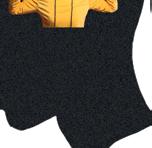

The marking feature of dating apps is the ease with which one can sort through potential suitors. On mainstream apps like Tinder and Bumble, you see someone’s face first and if you don’t like what you see, you can simply swipe it away. A research study from Michigan State University found that most swipes are made in less than a second. Among a small sample of UP students, swipes are often made in less than 5 seconds, with the average being 3 seconds. Such a fast transition from seeing the face of a potential match for the first time and making the decision to whoosh it away begs the question of what influences that decision.
Along with the fast paced changes in technology during the late 1900s came the progression of almost every aspect of life, including dating. The very first smartphone emerged around 1993 and shortly after that came the very first online dating site, Match.com - a huge step up in convenience and novelty when compared to matchmaking questionnaires that were the only form of ‘online’ dating back then. The new era of online dating has put the power into the hands of the user and continues to do that today. On apps such as Tinder, Hinge, and Bumble, the images one chooses on their profile are particularly important because that is the first thing that others will come across. So have dating apps made us more superficial - well, yes they have.
Dating apps emphasise physical appearances. From prompting new users to choose pictures that highlight their best features to showing pictures first and bios later (where some apps even forego
bios and allow users to use pictures only), it is clear to any user that the nature of online dating is rather superficial and physical attraction is essential to their success, at least at first. It is possible to build a meaningful romantic relationship from a dating app and particularly through this looks-focussed approach, especially if one values physical appearance in a partner. However, dating apps tend to champion appearances over a genuine connection, to the disadvantage of those who do not consider potential partners’ appearances as the highest factor when dating. Tinder is now infamously known as a hookup app due to its intensive focus on pictures. There is even a new feature called “Best Photo” that optimises dating profiles to show the pictures that get the most right swipes first. Not only can this be a vain method of forging an authentic connection but, viewing other people through the lens of their appearance can cause one to view themself that way too and hence, heighten insecurity. One could argue, “well, am I not rejecting the same people online as I would be in person”. Yet, one’s physical appearance is just as important in real life, if not more so because there is no bio to supplement one’s validity as a prospect. Not being “easy on the eyes’’ or not appealing to certain people (due to their preferences and what they find attractive) is bound to produce fewer prospects, both online and in person.
The apps are framed around their users and this is clear given the fact that the average swipe is made in less than five seconds of seeing a profile. It takes longer to watch a YouTube ad. However, face-to-face interactions can turn platonic connections into romantic possibilities and many people can attest to the change of heart they experienced once they got to know someone past the initial attraction, (or lack thereof) and embraced someone’s deeper qualities. Online dating can forfeit that possibility and can lead to many people finding the process inauthentic in the long run.
But these apps can include other aspects of dating in their algorithms. Hinge is a dating app that facilitates a more extensive profile by prompting users to fill out each prompt and build a thorough bio before they can begin to match with people. Its slogan is; “the dating app designed to be deleted.” So, there are apps that pull their interfaces away from superficiality and try to afford users the best opportunity to make genuine connections.
Another main allure of dating apps is an increased amount of options. Much like social media apps, it can feel like the content never runs out.
There is always another face to be swiped on - which can create the illusion of endless options which is a far stray from the truth of dating which is often less open. However, there can also be a lot of disillusionment with the process of online dating when pitfalls such as someone not looking like their profile pictures, a classic catfish, or a Tinder Swindler situation. There could also be the chance that physical attraction is all you have in common and other qualities have been ignored, leading to the early detriment of many Tinder matches.

On the contrary, many people that have found that dating apps have not made them more superficial; instead, they have improved dating experiences because of the ease with which they can expand their dating pool. Queer people have an easier way to connect and people who are often compromised in social situations, such as people who are disabled, can navigate dating on their terms by enjoying some of the other features of dating apps like narrow filtering and geolocation settings.
Have dating apps made us more superficial? Perhaps so, perhaps not. Although Tinder has gained the reputation of being a casual hookup app, it has amassed 75 million active users, many of whom are hoping to find serious relationships from the masses of hopefuls, some of whom will be successful. Although many people know that superficiality is something that they will either have to assume or entertain when deciding to use dating apps, they continue to flock to these apps daily. It seems in either situation, whether offline or online, superficiality is and might always be a factor at play. Thus, the question changes from whether dating apps have made us all more superficial to have dating apps improved our overall dating experiences. Superficiality and all.
TikTok, like many other social media platforms, is open to manipulation by bad actors, something which is extremely dangerous for a platform used by so many young people who are easily influenced
“
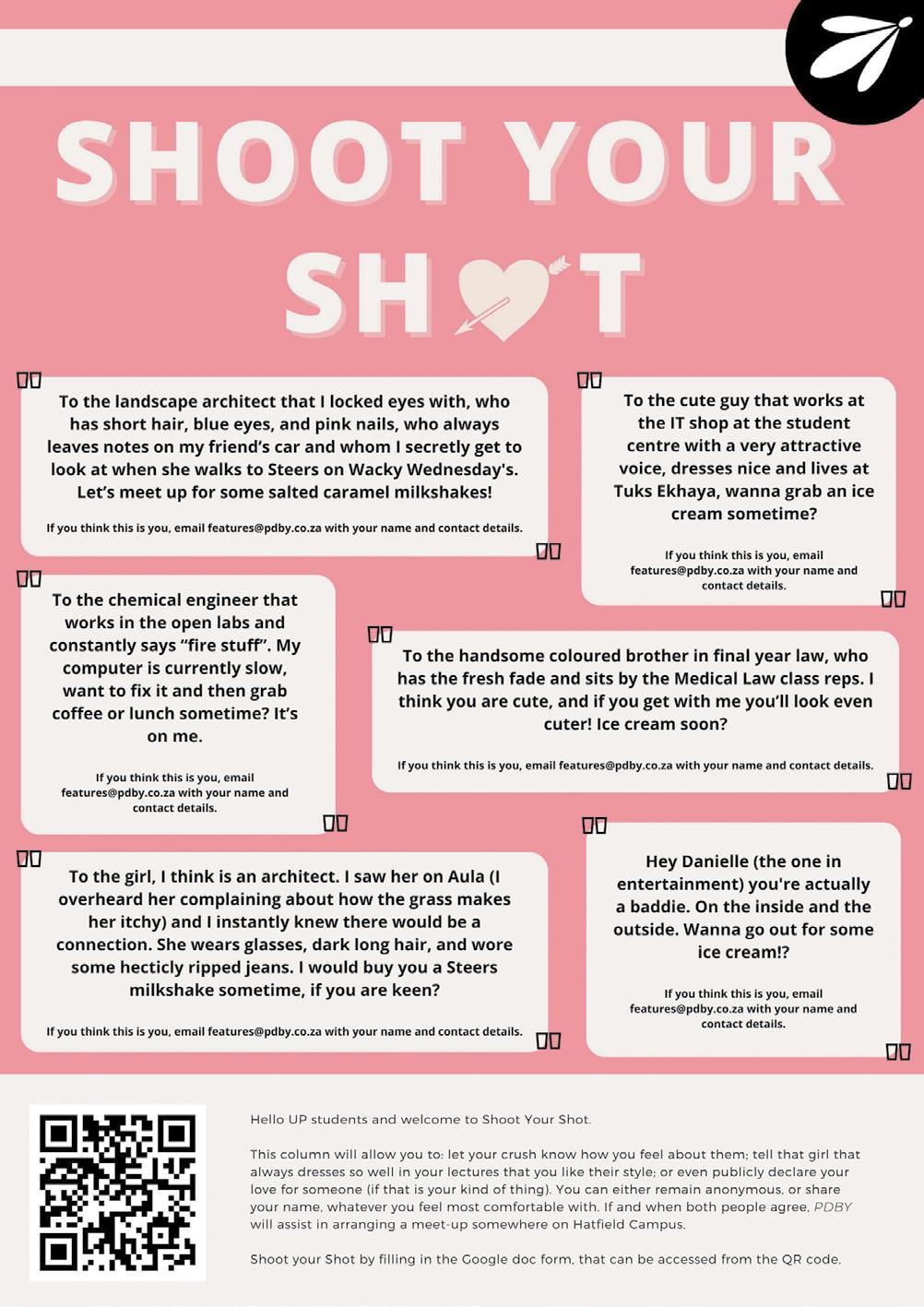
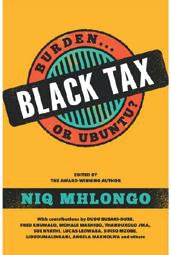 Vuyiswa Fumba
Vuyiswa Fumba
Black Tax is a nonfiction compilation
book edited by awardwinning author, Niq Mhlongo. It is composed of short stories from 19 talented South African authors who narrate their personal experiences on the infamous subject of black tax and discuss the nuances that surround it in the Black South African community.

This book frames the case of black tax in the duality of its nature: what it has immeasurably given to the communities that hold it as an unchangeable law and what it continuously takes from the modern young adults who are inconvenienced by it. One view is that it is rightly labelled as tax and the other believes that it is greatly insulting to the Ubuntu-esque nature of this tradition - which has upheld entire families for generations.
This book is evocative enough to leave the reader with a clear view of the effects of black tax in their own life and also elicits the desire to understand it as meaningfully as the authors of this book do. The book’s commendation reads, “in giving voice to so many different perspectives, Black Tax hopes to start a dialogue on this widespread social phenomenon.” This is a great read for anyone who is desperate to get out of their head and into the deepest musings of various writers.
Quiz nights in Hatfield are an excuse to go out with friends, stretch one’s trivia knowledge and possibly win some free drinks at the end of the night.

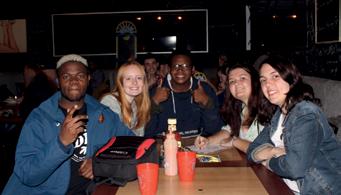
Altum hosts its quiz night every Wednesday at 19:00. The atmosphere is fun and relaxed. There is chalkboard paint on the walls to allow the bar’s patrons to leave messages or drawings. So for those with an artistic inclination, or anyone who wants to make sure the world knows that their team won, the space is open to grab some chalk and leave a mark.
The quiz requires a good team name to enter – creative wordplay (and bad puns) are highly encouraged. The quiz is structured into rounds of ten questions, and the winners of each round receive free shots. The grand prize is a R500 bar tab that goes to the team whose general knowledge is strong enough to take first place overall. For those who think they
Comic Con Africa returned with a bang this year, after a two-year hiatus due to the COVID-19 pandemic. Crowds of thousands flocked to the Johannesburg Expo Centre for the convention’s fourday run, with almost 20,000 people attending on 24 September alone.


The event boasted three halls dedicated to gaming and pop culture, including hundreds of stalls selling artworks and merchandise, activities such as trivia quizzes and retro arcade games, and celebrity guests who took to the main stage to speak about their latest projects and answer fans’ questions. The guest who drew the largest audience was Jamie Campbell Bower, who most will recognise as villain Vecna from the latest season of Netflix’s smash-hit series Stranger Things, and who has also appeared in the Harry Potter and Twilight films. Stranger Things had a strong presence in the convention as a whole, with a tent that advertised a Stranger Things experience being one of the most popular attractions, and cosplayers arriving in sailor suits or “Hellfire Club” shirts to represent different characters from the show.
There was a diverse array of cosplayers in general, ranging from simple outfits that evoked a character’s style to fully-fledged, intricately built costumes that closely imitated the appearances of
fictional characters. From anime characters to Disney princesses, comic book villains to Jedi knights, the cosplay was perhaps the most impressive element of the convention – though many of the con-goers had to brave the heat in order to look their best. However, in spite of the vast array of cosplay choices, the most prominent IP that everyone and their eldery family decided to cosplay was: Demon Slayer’s endless sea of Nezukos, Tanjiros, Inosuke’s and Zenitsu’s. That said, a welcome cosplay was the family that came as Minions and Gru, as well as the couple that came as Rick and Morty.
Though the main attractions of the convention were located in the three halls, the outdoor areas were also extremely busy. There were many food stalls to cater to the con-goers, though the unprecedented number of attendees on Saturday certainly caused strain, with long queues for refreshments and the sweltering heat detracting from the overall experience of the convention. Though drawing such a large number of people is an impressive feat for any event, this created a somewhat claustrophobic atmosphere; the crowds were reportedly much more manageable on Thursday and Friday. Perhaps a recommendation for next year is to hire more food stalls and position more tables with better options for shade.
Another impressive attraction at the convention was Artist’s Alley, an area dedicated to various artists both local and

can truly excel, there is even a leaderboard of teams who score the highest.
Though it makes for a great night out, Altum does more than just host weekly quiz nights. Situated in central Hatfield, Altum opened its doors in February, aiming to be the new hotspot for students. It has a bar, vape lounge, two nightclubs and an open courtyard that turns into a dancefloor on the weekends, ensuring that whether one is looking for a wild night out or a more relaxed environment, Altum has multiple options. They also take safety very seriously; the parking area is fully secured, and security is available throughout the venue to ensure that all patrons have a safe, and enjoyable experience. Altum also hosts their own festival every month, AltumFest, which features thrift stores, food stalls, live bands and several DJs. As a new student spot that caters to all kinds of events, Altum has something for everyone.
international. Guests included renowned comic book artist Steve Ellis, who has worked on both Marvel and DC comics and published his own series, as well as Johannesburg-based artist Sean Izaakse, whose work includes runs of Marvel’s Thunderbolts, as well as the Pathfinder RPG comics.
Another artist worth speaking about was comic book veteran Zach Howard. Howard shared his experience within the industry and how it has shaped his approach to life: “you can be a hobbyist, you can be a professional, there are a lot of people who focus more on the fact that they suck at the beginning but who cares.Just jump in.” In addition, Howard went on to explain his experience working with Mike Mignola, saying, “he’s a master in this craft. Even on the bad days, you realise what a genius he is.” Howard’s biggest achievement came in the form of a collaborative project of turning the actor/celebrity Common into a comic book hero.

The Artist’s Alley also had stalls where fans could buy trinkets, clothes and other items from local businesses – though in many cases, the perfect piece of memorabilia did not come cheap, with some stalls engaging in blatant price gouging. Many stalls offered unique artworks and collectibles, as well as some beautiful handmade items (including jewellery and dice sets), so anyone interested in attending the convention in 2023 is advised to be financially prepared beforehand.
In all, the convention was a whirlwind of activity at an impressive scale. Though the crowds on the weekend strained the capacity of the venue, their excitement and enthusiasm indicated the enduring popularity of events such as this, and ensured that the first Comic Con Africa post-pandemic was a huge success.
This spring, hastily emerging from the back end of August when varsity life was in full swing, and students were looking for that taste of student life which could unleash the hounds of academic expectations. Then, along came Lentedag with its pliers to cut the chain where the streets became jovial as students drank their way to and from the Botanical Gardens.
14 September began like any other day, if the day started with being covered in glitter and rummaging around for a bucket hat that was last worn in 2019. After locating the essentials, the next logical step would be to grab the Black Label and put on the smudged sunglasses.
at the rowdy crowds would have likened the scene to a romantic tragedy, betting on whether students torn between abandoning their inhibitions through well-priced alcohol would stand their ground or would rather follow the sound of the music, which demanded both attention and attendance.

*Please do not subject your white shoes to this, unless you are deciding to buy a brand new pair the next day.

Upon locating your friends: some too drunk, the others too sober, one running down the street with wine, another eating breakfast as you board the bus while the one is repeatedly losing and finding their student card - consider it go-time. The watch says 09:15, the gates open at 10:00, and by now most people are swaying to the sound of student’s marching footsteps as groups make their way to 1194 Prospect Street where a line of buses waits for them. The buses were sent from the Sonnop heavens. These buses, parked on the street waiting to be filled with drunkards, resembled the Holy Grail in the eyes of anyone who has ever tried to arrange transport to a festival. No need for Ubers or problematic Bolts.
Once arriving at the Pearly Gates, lines were smooth, and persons were briefly, but lovingly searched. Finally, the celebrations could begin - on paper that is. Walking into Lentedag meant walking into a mosh pit disguised as a line for drinks. An omniscient onlooker, peeking down
However, amidst all the chaos and war-cries a woman dressed in black behind the bar pouring various liquids into plastic cups looked up, continuing to pour Brandy with no hesitance or shaky hands. When asked the existential question of what Lentedag has been like for her she uttered words of profound wisdom. “It is a lekker vibe”. Once the drinks have been secured, the sunblock long forgotten in between the abyss of one of the buses’ seats, and a narrow escape made from that friend of a friend trying to convince you that a beer funnel at 10 in the morning is a jolly good idea - there is a realisation that Lentedag is in full swing. Lentedag was ingeniously organised, having three different stages, for three different jollers. The first stage: (any wild guesses about the name of the stage shall be taken now…), was labelled Mainstage. Acts such as Siann, Zebra, Bernice West, Rubber Duc, Loufi, Fokofpolisiekar, and Synth Peter followed one after the other, the crowd enlarging after each set. By the time Synth Peter emerged, the crowd could be described as something no less than feral.
The second stage was ironically named the “Electronic Temple’’, and although there was no repentance, there were a few muffled prayers to make it out alive. Reinman Powered by the
Minentle Mndiyata
On 24 September, the Javett Art Centre celebrated three years of its establishment. In celebration of a successful three-year run, the Art Centre hosted a free entrance day, which coincided with Heritage Day. After having emerged from the lockdown and still thriving, PDBY paid the Art Centre a visit for its three-year milestone.
Launched in 2019, the Art Centre is a collaborative and multidisciplinary space situated on south campus. The space is open to students (and the public) as both a learning resource and a place for art enthusiasts. The space aims to make African art accessible, relevant and engaging. Current exhibitions include Yakhal’inkomo, a multimedia exploration of black South African visual artists. You can also find the Scenorama exhibition which foregrounds artistic experimentation and a pan-African aesthetic.

Jazz artist, composer, and UP alumnus, Keenan Meyer, has also been hosted by the Art Centre for a “one-night-only heritage experience.”
PDBY attended the Art Centre’s free entrance day which was filled with all sorts of fun. The celebratory event was attended by a diverse array of people. The event also gave an opportunity to vendors who were allowed to promote their businesses and showcase their work and services. Some of the vendors were selling traditional wear in commemoration of Heritage Day.
The first activity on the programme was a face-painting session for children. The activity was a fantastic way to immerse the younger guests into the world of art and creativity. A tour of the Yakhal’Inkomo exhibition, curated by Bongi Dlomo, was also available for the guests. This was followed by a tour of The Gold of Africa collection, which was curated
Garage, Natasa, Dean Fuel, Cinnamon, and Chunda Munki performed for the eccentric and excited.
The third and final stage, Hype Nation HipHop Stage, was named after the hip hop/ rap events that preceded the performances of Sixby9ine, Youngserno, DJ Q, Rarri, Wat3er, Mustbedubz, Phantom Steeze, Benny Chill (a Penryn College representative, if you will), Hype, and Venom. However, the existence of this third stage, tucked behind the bathrooms, was not known to the writers of PDBY, who are definitely not the ones writing this article. Maybe next time hang up a big flag for the different factions, or maybe next time the writer can just look at the map.
One of the main problems with Lentedag, was the inability to be in three places at once, as each act had something unique to offer. This has been one of the best organised Lentedag events, including the pre-COVID events. One of this festival’s most noticeable and appreciated elements was the tight security at the women’s bathrooms. Every third toilet had a female security guard outside, and the thoughtfulness of an act like this truly allowed women to just be people at the festival, as opposed to people having to constantly worry about safety. And of course, a special thank you will always be administered to the RedFrogs, who kindly kept many rascals, safe.
A special mention to the catering of the event, with both vegan and vegetarian food options being available. This festival catered for all students, marking it as one of those “once in your lifetime” events.


*Sometimes, at no fault of the organisers, the card machines do not have signal. Always have some cash on you in case.
*Although the drink prices are roughly the same as they would be at the strip, pre-drinks are always a good idea. But do not pre too hard, of course. It is a solid 8-hour day.
KIEF
“Fruity Juice” - Uncle Spike





“Crazy one” - Desmond and Tutus
“Bacon Avo Egg” - Uncle Spike
“Mexico” - Zebra
“Monokultuur” - Glaskas

“Aan die ontmaskerde”- Glaskas
“Way to go”- Die Heuwels
Fantasties, Thieve
“JD” - Zebra, Khai UG
“Midnight” - 340ml
“Colours” - Matthew Mole
“Energie” - Van Coke Kartel
Scan

with historic artefacts all the way from 1922.
Tshwane’s DJ Hebz kept the crowd entertained with a wide range of music from old South African jams to recently released hits. KACEY also gave a live performance which left the audience wanting more. The guests came in numbers dressed in their traditional attires to celebrate Javett and Heritage Day. Overall, the event taught people about the power of art and creative storytelling. The event’s spectacular exhibitions also proved that South African heritage is not only informed by cultural and traditional customs, but our history plays an important role too.
Shoutout to Jacques for the bangers
“Spring is the fresh green of young corn and the pink blush of blossoms. Autumn contrasts the yellowed foilage with violet hues. Winter is the white of snow against its black forms ... Summer is the contrast of blues and the golden bronze of the corn”
- Vincent Van Gogh
On 17 September, PDBY attended the Mr and Miss Gay Pride Pretoria pageant. This pageant which was held at the Barnyard Theatre in Menlyn Mall and provided a platform for queer people of all races that want to express themselves through their craft and intelligence. In attendance and serving as one of the judges was Randall Williams, the mayor of the City of Tshwane.
There were three categories, the casual category, which was accompanied by introductions from all 14 contestants. The second was swimwear and this category consisted of dance performances from the contestants. The last category was evening glam, where contestants were required to answer questions from the judges. The pageant coordinator, Francois Scheepers, said that as the queer community, “we need ambassadors to represent and assist the fight for equal rights and acceptance within our community” He continued to say that “[they] give this platform to all contestants and the winners, to make a difference with running campaigns and charity events.”



Among the contestants was the organiser of Hatfield’s drag show, Aurora Crysis, who came in with a buzz, snatching up second place. Miss Larrisa Vee Jones and Mr Marco Prins were crowned the winners, adopting the grand titles of Mr and Miss Gay Pride 2022. The former Miss Gay Pride, Gigi Mugler, performed a dance routine accompanied by one of the finalists singing and honouring those who committed suicide due to a lack of acceptance of the queer community. During these performances, white roses, each with the name of one queer person who passed, were given to the audience.

A major challenge that has plagued all of South Africa, was load-shedding, and the Mr and Miss Gay Pride contest was not immune from being dunked into darkness. Though this happened while a contestant was performing, the generators kicked in within less than 10 minutes, and the show continued. Even though this
event served as a platform for queer people, it was not entirely accommodating to non-Afrikaans speaking people, as most of the on-stage dialect and broadcasting was in Afrikaans. There were also approximately four people of colour in the audience. It was, nonetheless, an amazing event that stressed the importance of inclusivity. PDBY is excited to see more of this pageant and its continued strides to improve the show’s inclusivity for the audience and the contestants alike. This pageant makes for an excellent opportunity to spread the message of love and acceptance for all, no matter their lifestyle, race, or sexuality.
Letter to the editor:
Many congratulations can be given to the organisation and structure of Mr and Mrs Gay Pride. But one concern I had is the concept of celebrating pride in binaries, and the focus of pride landing solely on gay men. The community is comprised of lesbian, bisexual, pansexual, transgender, intersexual, asexual, and other queer members. ‘Mr’ and ‘Mrs’ still promote, a heteronormative standard, in a society in which that already pervades. We do need events such as this, and this event did have an important space in the queer community, but we just must consider the extent to which these events include all members of the community.
the opinions and beliefs of PDBYMedia.
Social media has become one of the most lucrative ways of making a living. During the pandemic, the one thing that occupied a lot of empty time was social media. The rise of social platforms, such as Tiktok and Twitch, was due to the countless hours people spent creating and consuming exciting content.
The students at UP are no different. Now, it is time to introduce a few fellow UP students who are succeeding on social media.:
YouTuber: Mitch Williams
Williams is a YouTube vlogger who has documented his journey at UP from his first year in 2018 to his fourth year in 2022. Williams is studying Computer Engineering, and his studies make up a massive part of his channel’s content. The rest of his channel is a mixture of fun daily vlogs about what he is doing in his life as a varsity student. It is incredibly enjoyable to watch first-year Williams transform into final-year Williams, especially because you can see his journey as a student pre-COVID, during COVID, and post-COVID. His content brings about a sense of nostalgia about personal growth during his time at university.
Another thing that makes Williams’ channel great to watch is how open and honest he is about his degree and UP in general. He has videos explaining what it is like as a Computer Engineering student and does not sugar coat
his experience. A highly recommended video is Williams’ Computer Engineering Students Give Recommendations and University Advice where Williams also collaborates with Computer Engineering to give advice and hard truths. A comment left on this video says“as a non-computer engineering student, I can still appreciate and take away the informative harshness of the video. People know that engineering is complex, but seeing fellow students giving the information that we all wish we had before picking a degree is nice.”
If you want to join Williams on this fun, informative journey, his channel is called Mitch Williams.
Tiktok: Makabe Tsolo
Tiktok was the unforeseen front-runner app of 2020, and since then, it has only gone above and beyond expectations. Makabe is an example of how to capitalise on the success of an app. He has a Tiktok account with relatable content, social commentary, and dances, and what adds an element of relatability, is how often main campus is in the background of his Tiktok dances.

He has enticing content and upcoming influencer energy. His social commentary, especially on UP fashion, provides amusement that captivates the audience. The comment section is a commentary on campus outfits and what is considered too much for campus.

Makabe’s Tiktok handle is @Tsolo.mm, and he has 15.2 thousand followers and 1.9 million likes. His highest video has 1.3 million views, showing the level of engagement with
his content.
Instagram: Lingling
Probably one of the more well-known people on this list is Sally Lin or better known by her stage name 6lingg, who is not only a UP student studying Information Design, but is also a host, promoter, and model. Her Instagram page is influencer based with gorgeous outfits, shoes and make-up looks, while featuring celebrities from Ricky Rick to Nasty C.
6linng has been known to perform at local clubs such as The Social Club and ZanZou. However, that is not all 6lingg has to offer, she has also begun her Piano Desk by LingLing series: where she puts people onto new Amapiano music while sitting at her desk. Looking at the story highlight of Piano Desk, it is encouraging to see her filming herself doing something which she obviously enjoys.
Piano Desk also features unknown artists, who send their music to her to promote. She has been involved in Instagram lives with other influencers, such as American influencer, Mansa Mayne, who currently resides within South Africa. She also works with brands on her page and posts relatable reels with voiceovers featuring South African music. This makes her page feel authentically South African as she embraces the culture of both her Chinese and South African sides.
When scrolling her page, it can be seen that she wears UP merchandise in and around Hatfield Campus while poking innocent fun at UP.
To support Lingling and her budding career, follow her @6lingg and join her 93,2 thousand followers.
Onke Mazibuko’s debut novel The Second Verse, is a new coming-of-age tale with authenticity and humour that delves into the psyche of a teenage boy. Bokang Damane is a 17-year-old boy living in East London in 1998. With his parents’ marriage is falling apart, and feeling alienated from his friends, he finds himself in trouble at school for writing an essay about suicide. Covering roughly two years in Bokang’s life, The Second Verse deals with teenage anxiety, awkward crushes and finding one’s place in the world. It also explores deeper issues such as addiction and mental illness.

The novel’s most substantial element is the protagonist. Bokang is a painfully believable teenager whose inner monologue is both witty and often deeply sad. He is obsessed with art and rap music, has a crush on a girl who is entirely out of his league, and does not fit in at his prestigious all-boys school. As the novel continues, he struggles with his mental health while navigating the turbulent waters of his late high school years. As well as writing fiction, Mazibuko is also a practising psychologist, which clearly informs the depiction of Bokang. Though the novel takes on a particular perspective, many aspects of Bokang’s character are relatable to anyone who has experienced uncertainty about their future. Since the story is told from his point of view, the narration takes on Bokang’s speech patterns – an affected imitation of the American rappers he loves, local slang and a bit of Xhosa. Though this narration draws the reader into Bokang’s mind, it can feel awkward at times, and highlights aspects
of 1990s culture that have not aged well (including the occasional use of slurs). The book’s timeline also includes several time skips, which indicate Bokang’s developing maturity, but also create pacing issues that may leave the reader feeling detached from the characters.
Though The Second Verse is concerned with Bokang’s social life and mental health, it also includes a heartfelt and harrowing exploration of his family dynamics, especially the fraught relationship between him and his alcoholic father, which forms the core of Bokang’s anxiety. Though he recognises his father’s destructive behaviour, he still wishes to have a relationship with him. The development of this relationship is authentic and well-developed, with the author unflinching in his depiction of the conflict between a parent and child, and the consequences that addiction can have on a family. Another fascinating aspect of the novel is Bokang’s attitude towards his culture – he wishes to undergo the traditional Xhosa initiation into manhood, but also wonders whether such a tradition is, in fact, outdated. His view toward these cultural traditions is also a source of conflict in the novel, presenting an interesting and nuanced question surrounding the contrast between tradition and modernity.
The Second Verse is a well-written, funny, and often tragic story that does not shy away from dark themes, but embraces them as part of life’s complications. Though the book does suffer from pacing issues, it still allows the reader to understand Bokang fully and wish for him to succeed. As both an entertaining story and a deep exploration of a teenager’s inner self, it marks the arrival of an admirable new literary voice.
Since the emergence of fiction and other genres, many female writers have either created genres that had never been seen before or adapted them to what they are today. PDBY looks at these females authors who deserve our recognition and the modern novels that correlate to them most spectacularly.
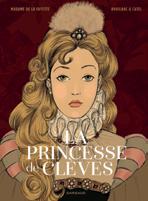
The first historical novel France’s first historical novel, written by MarieMadeleine Pioche de la Vergne, La Princesse de Clèves, was published in 1678 and became so popular that people outside of Paris had to wait months to get their hands on a copy. Set during the 16th century, a young wife suppresses her passion for a young nobleman outside of her social rank. A few modern historical novels that echo a similar tune as that of Marie Madeleine’s novel are: Silver Sparrow by Tayari Jones; The Tobacco Wives by Adele Myers; and Sisters of Night and Fog by Erika Robuck.
The “first” speculative fiction novel
Many literary scholars argue that Margaret Cavendish wrote the first science-fiction novel called The Blazing World, published in 1666, about 150 years before that of Mary Shelly’s Frankenstein However, her work falls more into the speculative fiction sphere,

where the novel is set further away from the real world, with supernatural, futuristic, or other imagined elements. Novels like that of Cavendish’s are Sea of Tranquillity by Emily St. John Mandel, The Monsters We Defy by Leslye Penelope, and Elsewhere by Alexis Schaitkin.
The first science fiction novel
Frankenstein, written by Mary Shelly, and published in 1818, tells the story of a man who plays God and makes a monster from different corpses’ body parts. In the end, all are made to face the sins of an unholy creation. Literary scholars believe this was the first esci-fi novel to be written. Another writer’s work that particularly stands out in modern science fiction is Ursula K. Le Guin’s The Left Hand Of Darkness, The Dispossessed and The Ones Who Walk Away From Omelas

Overseeing the well-being of the Gothic genre
Gothic terror writer, Ann Radcliff, cemented the rules of gothic writing, which raised the feeling of terror rather than horror. Her recipe is the ultimate nutrition for this genre for modern writers to establish themselves as prolific writers. Radcliff, being a caregiver to this genre after the prestigious The Castle of Otranto by
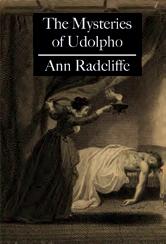
Horace Walpole, made sure to nurse it into the muscle of a category that Walpole never had the chance to do so. Among her gothic romance novels, her best-known work, The Mystery of Udolpho, published in 1794, created the platform for her to be recognised as one of the period’s most lucrative female writers. Novels that step into the mould of Ann Radcliff’s prestige are: Mexican Gothic by Silvia Moreno-Garcia; Rebecca by Daphne du Maurier; and Our Wives Under the Sea by Julia Armfield.
Ghost stories grow up so fast
Elizabeth Gaskell’s short stories gave us some characters that we know and love: devil, banshee, cursed nun and the poltergeist. Gaskell’s efforts established them and their place within the ghost story genre. In Priorto Gaskell’s short stories, ghosts were meant to aid the living, and served as metaphors for what was bothering the living.
In those times, it was a common tradition to tell of ghosts and things that go bump in the night under mistletoes and next to fireplaces, A Christmas Carol is an excellent example of this tradition. It is common sense to think that these stories were not too spooky. However, Gaskell changed the genre to what we know it to be today. Her stories, back then, broke out of its confines to tell stories of how vanquishing evil is not as easy as using a bit of burnt sage, but rather, the characters are taken deeper into themselves by forces they only know to exist within a nightmare. Some novels that could raise the hairs on one’s body like that of Gaskell’s include: The Woman in Black by Susan Hill; Beloved by Toni Morrison; and The Monkey’s Paw by W.W. Jacobs.
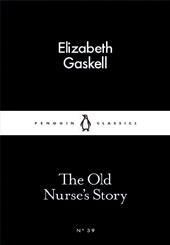
The Second Verse is a wellwritten, funny, and often tragic story that does not shy away from dark themes, but embraces them as part of life’s complicationsImage: penguinrandomhouse.co.za


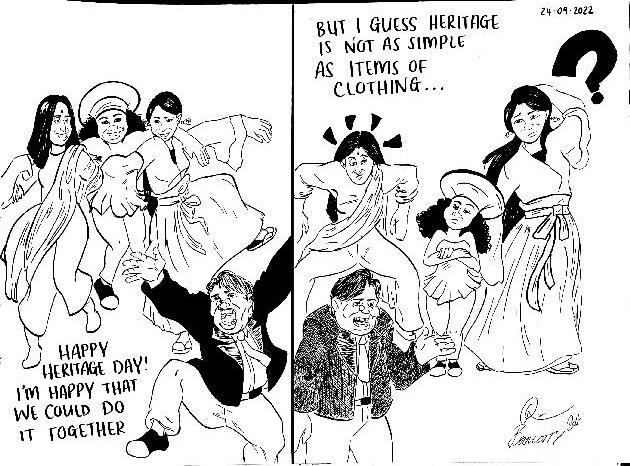
your mobile and find their solutions by flashing the codes below:
Play these sudoku puzzels online or find their solutions by scanning the QR codes.
Play these sudoku puzzles on your mobile and find their solutions by flashing the codes below:




The Sport, Exercise, Medicine, and Lifestyle Institute – or SEMLI – is your typical hidden gem that most students walk past without even knowing it. Nestled away in the large High Performance Centre (HPC) building, which greets you at Hillcrest Campus’ entrance on Burnett Street, SEMLI offers a multifaceted institution offering a plethora of services, ranging from nutrition to radiology. The Institute’s focus is on research, education, and training – all of which they hope to gain international-recognition for, and more often than not, you may pass a local football hero, or a swimming legend, when you are nearby.
This is relevant to a ‘typical’ UP student because SEMLI does not just offer their services to the budding or professional sports person – but rather all students can enjoy their expertise. For example, fourth-year physiotherapy students offer free consultations at Rembrandt Hall (from 7:00-14:00, Monday to Friday). All you need to do is make a booking (by contacting 012 484 1711) and, voila, you will be sorted in no time. They also have an on-site gym, so no-matter what your needs, you’re bound to find what you’re looking for.
It is no secret that in order to maintain a healthy and balanced lifestyle, we need to take care of our physical health as much as our mental health. UP has consistently emphasised this point, stating that with regular exercise, our mental well-being is benefited, especially during challenging times, such as exam-season. We should all aim to be informed and fit, and SEMLI can and does play a crucial role in this quest

Walking around Hatfield campus, one may run into large chess boards that have been put near the Aula, Thuto, and 10’zs. According to ‘Sprout Landscapes’, they are there to allow students to blow off steam and interact with others in-between classes.
Chess has a long history that spans many centuries and is, therefore, a game most associated with older generations. However, the Netflix-produced series The Queen's Gambit have helped sky-rocket the game’s appeal. The game itself, although somewhat daunting to begin with, is less complicated than its reputation suggests. You may believe the game requires a high level of thought and for you to be a ‘genius’ right off-the-bat, but most people around campus just play for fun, to take their minds off of the demands of campus life. The many benefits of playing chess include an improvement in memory, calculation, visual-spatial skills as well as critical-thinking ability, all of which can lead to reduced cognitive decline (postponing the onset of dementia).
One of the many students who make regular use of these boards is Jermi Ramakrishnan, a third-year Industrial Engineering student. He played in high school and still, of course, enjoys the game now. He sees it less as a ‘Queen’s Gambit’ style high-stakes game but, rather, as a way to ‘kill time’ in-between classes. When asked if chess helps him in his studies, Ramakrishnan said no –for him, it’s all fun and games.
Chess' popularity seems to be on the rise, from TV-shows and online games galore – some of which are quite lucrative for players. Recently, there was a huge scandal in the chess world when the 31-year-old Grandmaster, Magnus Carlsen (who rose to that rank at the age of 13), was beaten by 19-year-old Hans Niemann. The episode saw Carlsen accusing Niemann of cheating as, at the time of the tournament, Carlsen was ranked first and Niemann 40th. What raised further suspicion is that Niemann has previously been banned from online-tournaments for cheating.

Vuyiswa Fumba
If you have been on campus, you might have seen the first of many upcoming appearances of UP’s new mascot: a striking bateleur eagle named MVP. Not only are eagles known to have tenacious spirits, but the bateleur specifically is known to be adaptive to various conditions. According to TuksSport, “Masey (now MVP) is tenacious in their pursuit of their ideals of being a true Tukkie”.
What is most striking about our new mascot is that MVP is gender neutral. Regarding this, Angelica van Dou, the marketing and communications manager for TuksSport, said: “in line with the efforts of the university in creating an inclusive/non-conforming gender landscape, we felt that introducing a gender-neutral mascot is what was called for”. TuksSport sees MVP as a means to physically represent some of their values that cannot be adequately expressed through words.
PDBY interviewed Kherina Narotam, the chairperson of UP&OUT, to establish the society’s view on the gender-neutral eagle. Narotam indicated that neither she nor UP&OUT was involved in the creation or institution of this mascot. She expressed that the transformation that TuksSport is trying to achieve by introducing a gender-

neutral mascot is especially appreciated however, voiced some concerns about UP potentially using this mascot as a front to hide deeper issues that queer students face.
When asked, Narotam affirmed that she views this as a constructive first step in creating the change that TuksSport referred to above. In addition, she stated, “I’m more curious to find out how [UP] will handle one of those situations in the future because it is inevitable that there will be a trans student participating in sports at some point in the future. And that will be the true testament to whether UP is transformed or not; a mascot is just one step.”
Mascots can be a great way to build connections and affinity amongst people, especially within a vibrant student community like that of UP. It can establish a sense of belonging in everyone, from faculty members to students and alumni in aspects of student life that transcend sporst. So, introducing a gender-neutral mascot with the specific aim of inclusivity is a laudable step in the right direction. However, the first step does not conclude the journey.
These scandals are not limited to these international tournaments as UP has had its own chess scandal – the case of the missing king piece belonging to the Thuto board remains unsolved (if you have any information regarding ‘King-gate’, don’t hesitate to reach-out to PDBY).
The world of chess is very interesting and large, and one PDBY reckons could see a UP student, a Magnus Carlsen or Beth Harmon, rise up and clinch the title of Grandmaster.
‘Queen’s Gambit’ showed Harmon come from nothing to become Grandmaster so, what can start out as merely a way to kill time could, maybe, become something that completely changes someone’s life… could that someone be you?
Chess is an official sport at UP and students can join the university’s club for R500.
The University of Johannesburg (UJ) and Tshwane University of Technology (TUT) headed to the Varsity Football Cup final. This came at the end of an eventful competition where eight teams battled it out to make it into the top four of the tournament. Initially, UP’s football team stood out as a favourite, but with them losing their first two fixtures (3-0 and 3-1 respectively), their chances of making it into the top four were slipping away. Heading into the third game, they were searching for their first point but, instead, got three of them by defeating North-West University (NWU) 2-1.
UP Tuks carried this momentum to their two subsequent games, which they won. The seventh round fixture was an important one for UP Tuks because they had to fight for the three points against Wits to keep them in contention for fourth place. However, their aim of making the top four was put on hold as Wits was able to see out their 1-0 lead against UP Tuks.
PDBY interviewed two fans of UP’s football team, Sifiso and Moses, who both initially predicted the team would surely secure top four, but were devastated after the game with Wits. When asked their thoughts on why UP Tuks had failed to make it, Moses said that he felt that UP Tuks did not have the “mental fortitude” to compete against these teams and what he found especially frustrating was their inability to win against what he felt was an “unprepared, shaky UJ team”. Sifiso felt the team gave it all they had, but it was down to “luck not being on our side.” It sure seems Tuks will be looking to improve (in a lot of areas) in light of these results. What are your predictions for the upcoming season?
